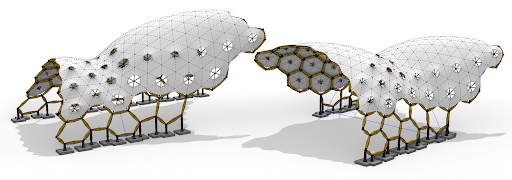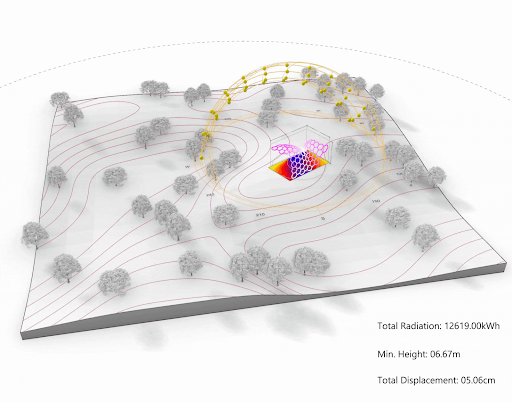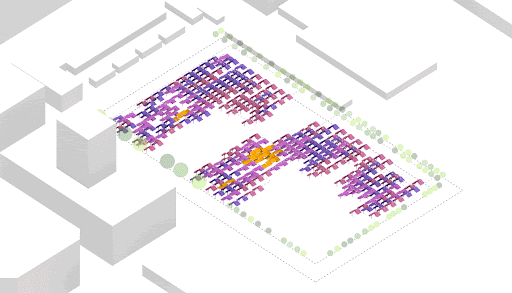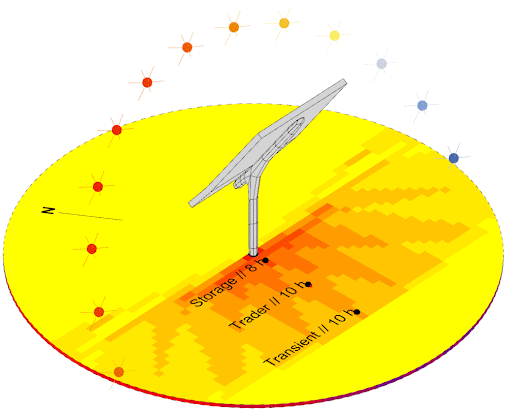IAAC – Institute for Advanced Architecture of Catalonia
Global Summer School Program 2023
Online Course: Environmental Design
Duration: from the 24th until the 28th July 2023
EXPANDING THE BOUNDARIES OF SUSTAINABLE DESIGN

Ph credits: Hex_Timber.Canopy_ Uri Lewis Torres_Faculty: Rodrigo Aguirre | Faculty Assistant: Ashkan Foroughi

Credits: Hex_Timber.Canopy_ Uri Lewis Torres_Faculty: Rodrigo Aguirre | Faculty Assistant: Ashkan Foroughi
Syllabus
In today’s architecture, engineering, and construction industry, sustainability has become more than just a buzzword – it’s a fundamental aspect of responsible design. As professionals in the AEC field, we have the unique opportunity to make a positive impact on the environment through informed decision-making and cutting-edge technologies. This comes with the responsibility to do so from a standpoint of knowledge and diligent evaluation.
Aligned with the necessity for performance in design, a growing suite of environmental analysis and simulation tools are developed and readily available within mainstream CAD frameworks. Literacy around environmental data analysis and the ability to use environmental simulation as drivers of the design process is key to the toolset of the emergent architects, urban planners, and decision-makers. However, in a world of increasing design complexity, the ability to run and present environmental simulations as part of design exploration is only the starting point.
Today’s designers must view design ideation as a continuous self optimizing process, and must therefore master processes like parametric design and genetic optimization to develop concepts that respond to a multitude of conditions. This workshop aims to take students through the complete workflow of evidence-based environmental design supported by a parametric generative optimization framework to enable the exploration of vast design spaces.

Credits: Grand Parade Market _ João Silva // Gerald Mandevhana_Faculty: Angelos Chronis // Aris Vartholomaios
Starting from the analysis of an existing unused plot or a site selected for rehabilitation, students will formulate the design problem, develop an optimization hypothesis, parametrically explore the wide solution space and propose an optimal solution supported by data. This hands-on investigation will enable students to apply state of the art analytical techniques to complex problems in real context.
Credits: Grand Parade Market _ João Silva // Gerald Mandevhana_Faculty: Angelos Chronis // Aris Vartholomaios

Learning objectives
At course completion the student will:
- Learn key concepts of environmental analysis using parametric tools
- Understand concepts of multi-objective optimization
- Understand how to define sustainability goals as measurable design parameters
- Learn to setup a generative optimization process
- Be capable to perform multi objective optimization on a parametric model
- Be able to set out an optimization strategy on a given problem
Faculty

Oana Taut is a Romanian architect and computational designer specialised in the field of AI in architecture. She obtained a Master’s Degree in Advanced Architecture from the Institute for Advanced Architecture of Catalonia.
Oana is the founder of BuildFlow where she leads the research of generative optimization and generative AI models to help design of performant and creative architectural space. Her overall professional aim is to design quality space based on objective data, and materialise it in a sustainable way. Her master thesis project developed in IAAC is a research on the topic of artificial intelligence as enabler of a renewed architectural process.
Oana is also leading the Future Cities studio in CIEE at IAAC. Before becoming a computational architect and AI researcher, Oana had gained extensive professional experience working educational, residential, hospitality and master planning projects internationally.
buildflowai.com
oanataut.com
linkedin.com/in/oana-taut-84958020/
Faculty Assistant/s TBA
WEEKLY SCHEDULE & TIMETABLES
Option 1 – Synchronous calendar (Barcelona time – GMT+2)
Recommend to European, African, Asian and Australian participants.
From Monday 24th July until Thursday 27th July 2023
Teaching activities will run from 10.00 to 14.00 GMT+2
– 8 hrs of live teaching
– 8 hrs of live mentoring and exercises review
– 1 hr of IAAC summer lecture
– Final GSS diploma certificate ceremony
Option 2 – Asynchronous calendar (America time – GMT-4)
Solution recommended to participants from all the time zones who are looking for a more flexible schedule.
From Monday 24th July until Friday 28th July 2023
Live teaching activities will run from 11.00 am to 1.00 pm (GMT-4)
– 8 hrs of recorded teaching
– 8 hrs of live mentoring and exercises review
– 1 hr of IAAC summer lecture
– Final live GSS diploma certificate ceremony
Previous Knowledge / Students background requirements
The workshop is open to all applicants with a bachelor degree related to the fields of Architecture, Design, Arts and Engineering willing to engage in the program. A basic understanding of parametric tools (Grasshopper) is required. Although it’s not a prerequisite, any previous scripting experience will be useful for the course. No previous extensive knowledge is required. The participants will receive lectures and classes to be introduced to the workshop’s topics, softwares and tools.
Hardware & Software Requirements
Main & secondary software
Rhinoceros 7.0. The 90-day trial version can be downloaded from the website www.rhino3d.com/eval.html – Rhino needs to be able to access internet, so crack Versions won’t work for this workshop.
Other software to be specified by session.
Because Grasshopper 3D works best for the Windows operating system, we recommend students to have an installation of Windows (preferable Windows 10 x64). If you have an Apple computer, it is recommended that you install Windows on Boot Camp which will perform better than Parallels or VMWare. It is recommended that you max out the RAM potential on your computer.
Plugins
All Grasshopper plugins will be provided by the instructors.
Hardware
8 GB memory (RAM) or more.
At least 600 MB space in the hard drive.
Operational System
Windows 10, 8.1 or 7 SP2 (Grasshopper 3D is only currently available for the Windows operating system. For this reason, every student is required to have an installation of Windows).
Note: If you have an Apple computer, it is recommended that you install Windows on Boot Camp which will perform better than Parallels or VMWare.

